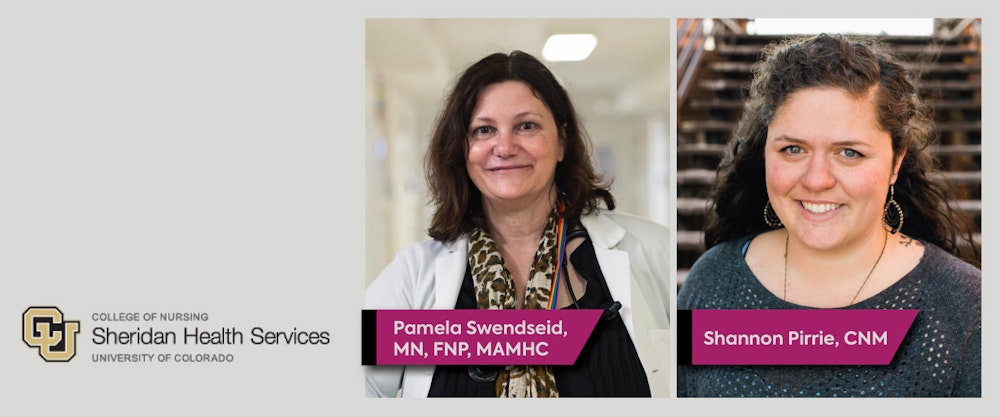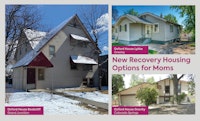
HERE FOR LIFE
Connecting moms to care long past prenatal visits
At its best, integrated care for moms is both multi-faceted and available to them for an extended period of their lives. A beautiful example of that is Sheridan Health Services, with their commitment to integrating behavioral health counseling, midwifery, OB-GYN care, pediatrics and primary care. They offer these services to moms throughout life, regardless of their substance use diagnosis or recovery status. To make whole-person care even more accessible, they also have dentistry and a pharmacy in their building.
As a nurse-managed, federally-qualified health center, Sheridan Health Services focuses on wellness and disease prevention. Last year, they had nearly 8,000 visits, and over 30 babies were delivered; which included caring for moms who had substance use disorder.
Shannon Pirrie, CNM (Certified Nurse-Midwife), is the Specialty Director of the Nurse-Midwifery Program. “When it comes to moms dealing with substance use, it’s not just time to be an advocate for a woman’s health, but to connect them to multiple resources and show them that healthcare providers care about patient outcomes,” she explained. “By seeing these patients regularly, perinatal care helps these moms understand the healthcare that they deserve and brings it to them.”
Shannon works alongside Pamela Swendseid, MN, FNP, MAMHC who had been a family nurse practitioner for many years and found herself drawn to mental health and substance use in the context of primary care. “Helping these moms with substance use is my passion,” she said. “I think everyone has a story and I like to get to the reason why they are using and find out what we can do to truly help in their recovery.”
“We are very non-judgmental here,” Pamela explained. “We really take care of expecting moms and nurture them the whole time they're here. After they have their baby, they can stay with our practice and have that really important continuity of care.”
When working with moms with a substance use disorder, Sheridan Health Services helps to reduce barriers and make sure these women get connected to the additional services they need. If methadone is the right option for a mom, they connect them to the Opioid Treatment Program and then coordinate her prenatal care. They also make it possible for moms to do telehealth for OB care from the Opioid Treatment Program, so they are getting a level of prenatal care when they receive their daily dose. If a mom needs to be taking Suboxone (buprenorphine), Shannon and Pamela are both able to prescribe and monitor it. They coordinate with Maternal Fetal Medicine at University Hospital, consulting with them about whether patients need to transfer to the hospital.
“We never want to penalize or stigmatize moms for their substance use,” Pamela said. “We want them to keep coming for care because we are their best chance at helping take care of them and their baby. We don’t want them to get scared and not come back. The truth is, when a mom delivers, if she has used substances from 6 months onward, her drug use will show up in the cord blood. So, at some point, it will probably be found out. We want to help get them in a program while they’re pregnant because showing that they’re getting help will give them the best chance of getting to keep their baby.”
Shannon said they also detect other high-risk issues in pregnancy that their patients might be predisposed for, which is important because it means patients don’t have to go to a different facility or hospital where they may feel judged and be less likely to continue care. By offering pediatrics in the same place, moms feel comfortable coming back with their babies, which gives Pamela and Shannon more opportunities to also check on how mom is doing.
“We recently had a mom who came to us after five months of care elsewhere. She hadn’t divulged that she was using heroin or fentanyl until she came to us. We got her on Suboxone (buprenorphine) and helped her through what turned out to be a good delivery,” Pamela said. “But then she relapsed and was kicked out of her home by her husband. When her husband brought the kids back to our clinic, it was because he trusted us and knew that we knew their family. The mom then reconnected with us and we were able to get her into residential treatment and begin telehealth with her. Her story shows how important integrated care, from pre-natal to pediatrics and beyond, can be for these families. They know we are here for them for the long haul.”
Interested in learning more? Contact:
Sheridan Health Services
University of Colorado Anschutz Medical Campus
Pamela Swendseid, MN, FNP, MAMHC
Family Nurse Practitioner/Mental Health Counselor
Clinical Faculty Instructor, Primary Care and OB Clinical Lead
Shannon Pirrie, CNM
Specialty Director of Nurse-Midwifery Program
Instructor of Clinical Practice
Share this article:








